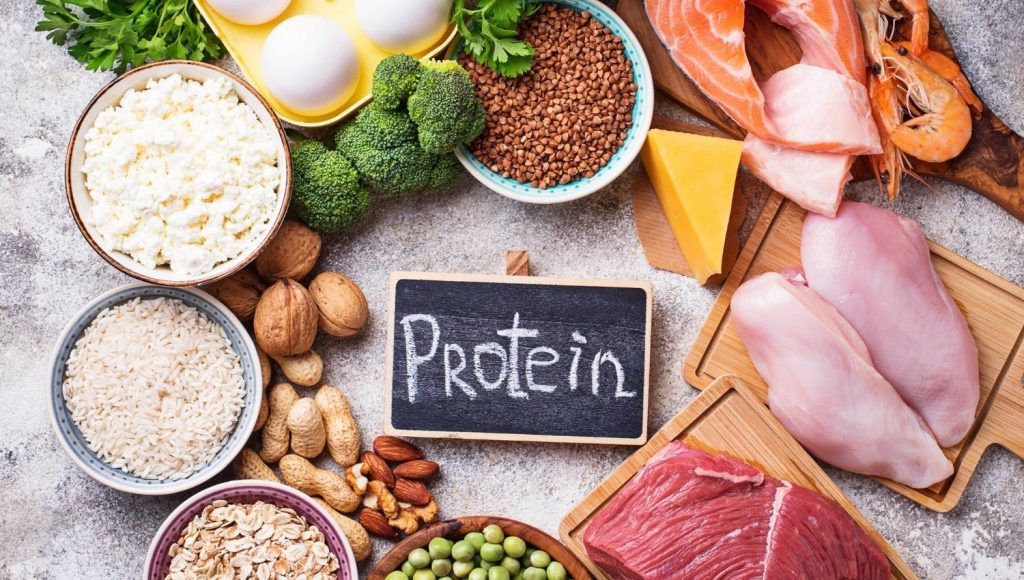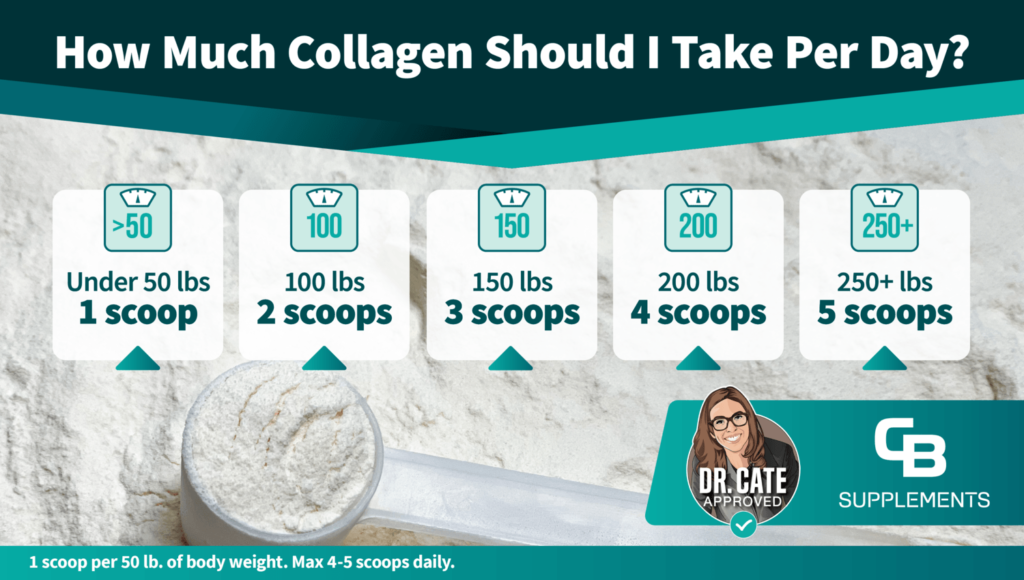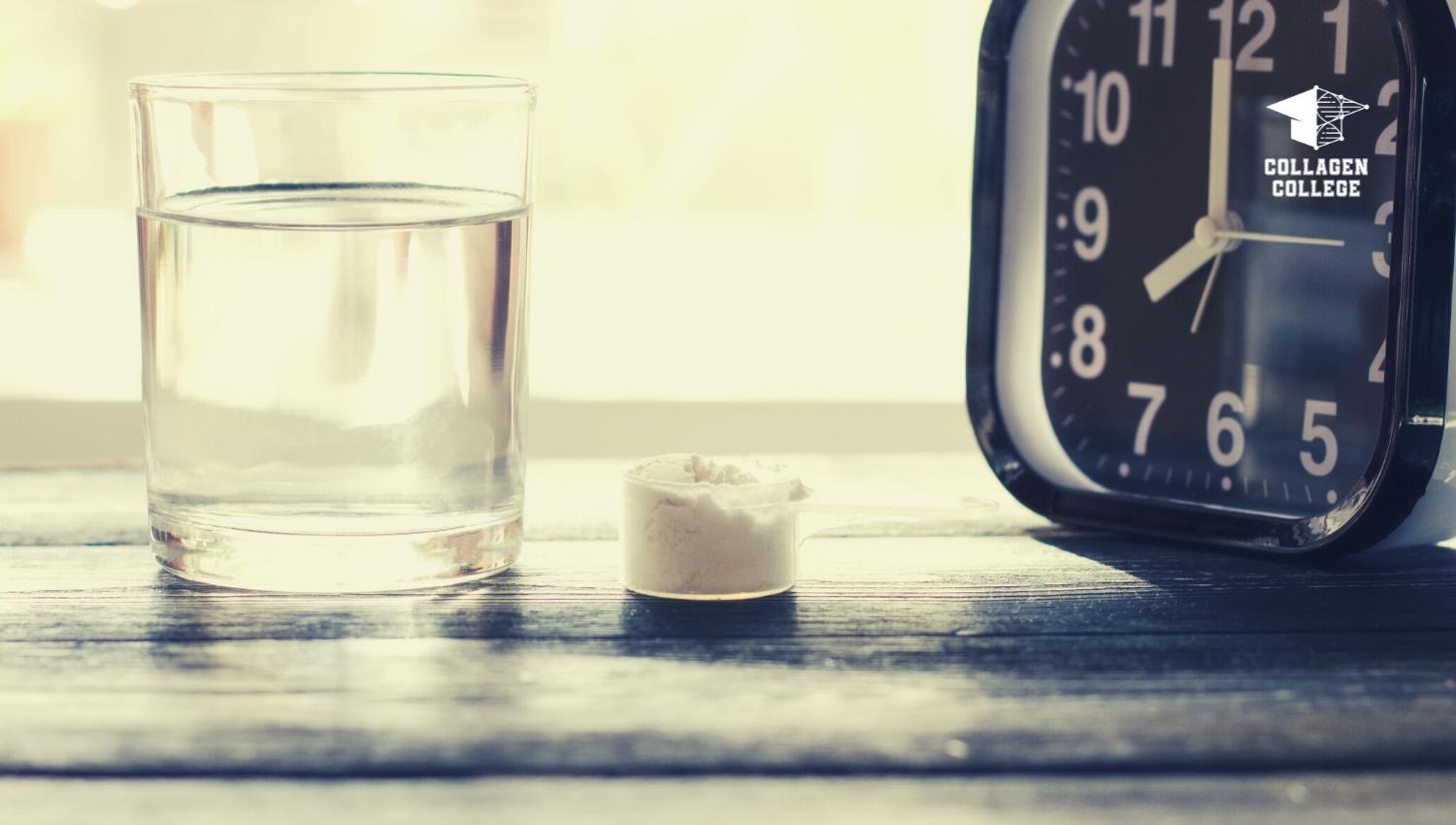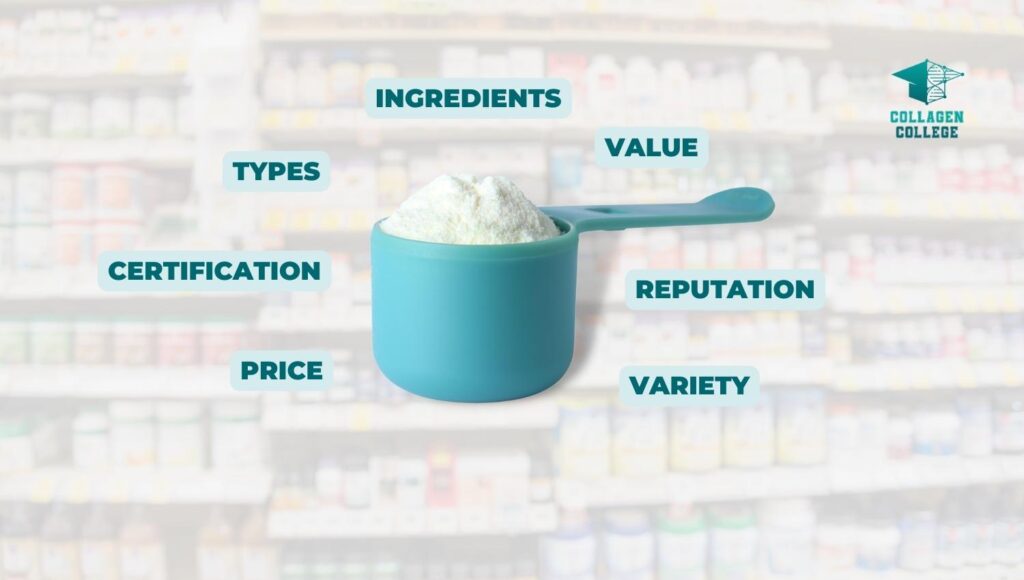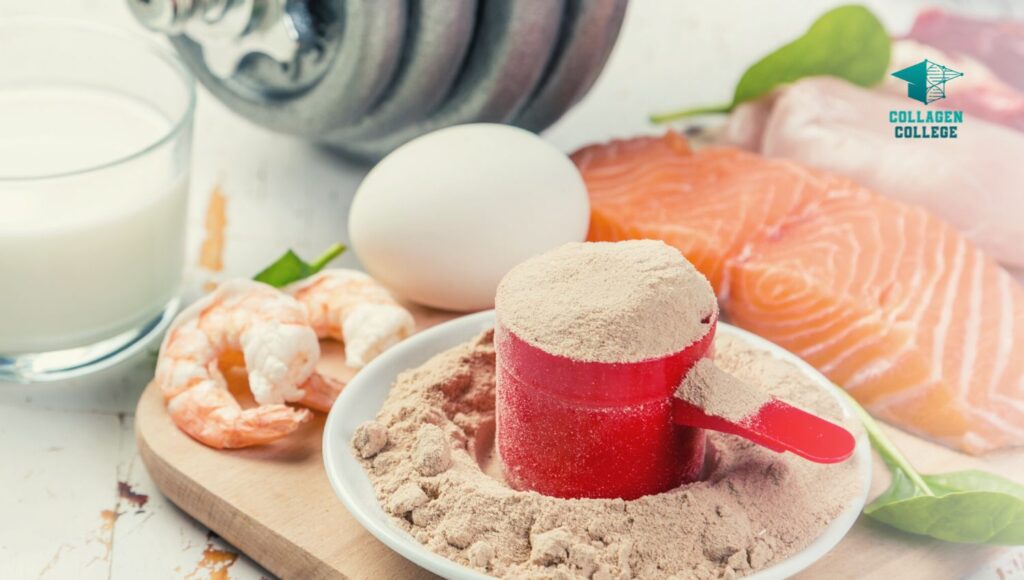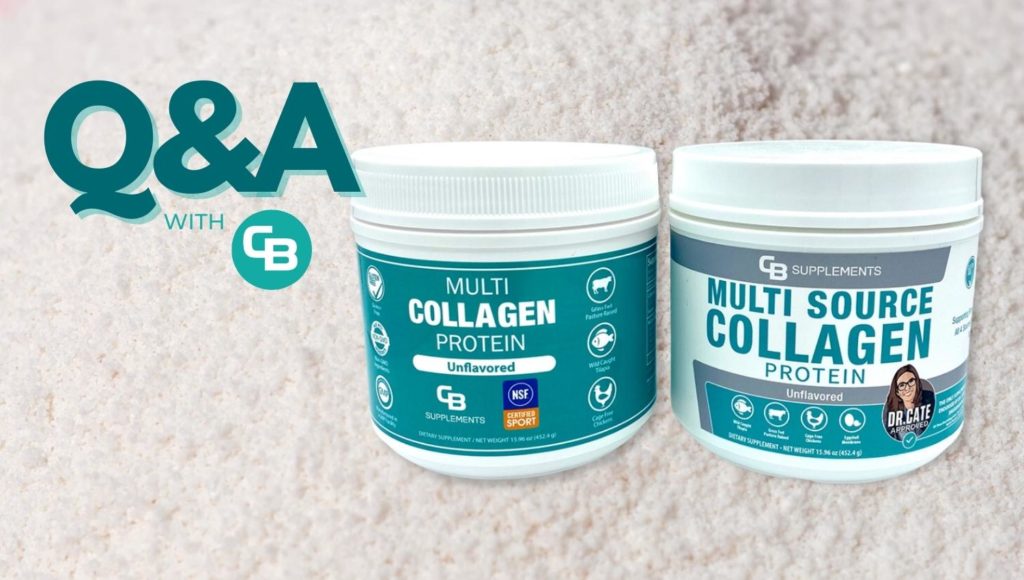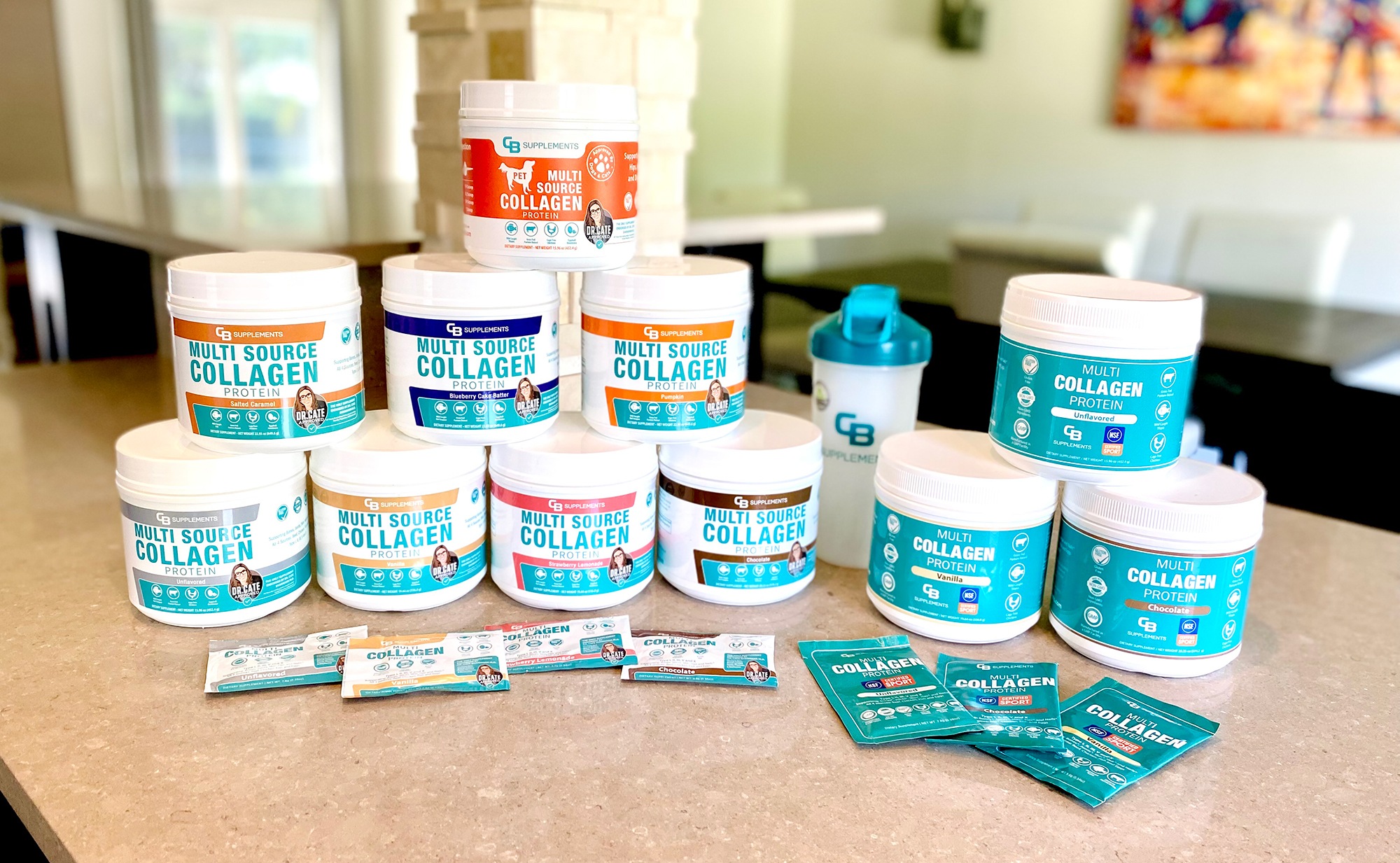We’re all flying a little blind with our collagen consumption.
Even the food and nutrition experts that determine RDA — the Food and Nutrition Board — are still figuring out this collagen dosage conundrum.
So, what shall we all do? The long list of collagen peptides’ benefits is undeniable. Should we play it safe with just a little collagen, or, go big and take in as much collagen as we can? Though the science of collagen is lagging, we can piece together the puzzle of how much collagen you should take per day with what we do know.
Let’s break this down.
How much protein do we need?
It’s hard to escape the question “How much collagen per day?” without broadening the conversation and discussing the RDA for protein, overall. Why? Well, collagen is protein!
Though you can’t answer this question without factoring in age, height, weight, bone thickness, muscle mass, and activity level, you may have seen these suggestions.
3 ways to calculate how much protein you need:
- Grams per Pound: MayoClinic suggests 0.8 grams per 2.2 pounds.
- By % of Total Calories: Many sources break this down by overall caloric intake, suggesting 10% to 30% of calories should come from protein.
- Protein Calculators: This protein calculator from the National Agriculture Library suggests I need 77 grams per day (I’m 6’1″, 212 pounds, and active in CrossFit).
Dr. Cate states the government set the RDA for protein too low. “They were set back in the 1940s before we understood protein metabolism as well as we do now.” She recommends 60-90 grams per day for women and 70-100 grams per day for men.
I’ve found that many people don’t eat enough protein. Especially thin people. I’ve discovered many of my patients unknowingly experience health issues due to inadequate protein.
— Dr. Cate, M.D.
Since collagen is protein, do you need 60 to 100 grams of collagen per day?
Collagen protein vs. other protein
Are collagen protein needs the same as non-collagen protein? We are not suggesting you need 60 to 100 grams of collagen protein per day.
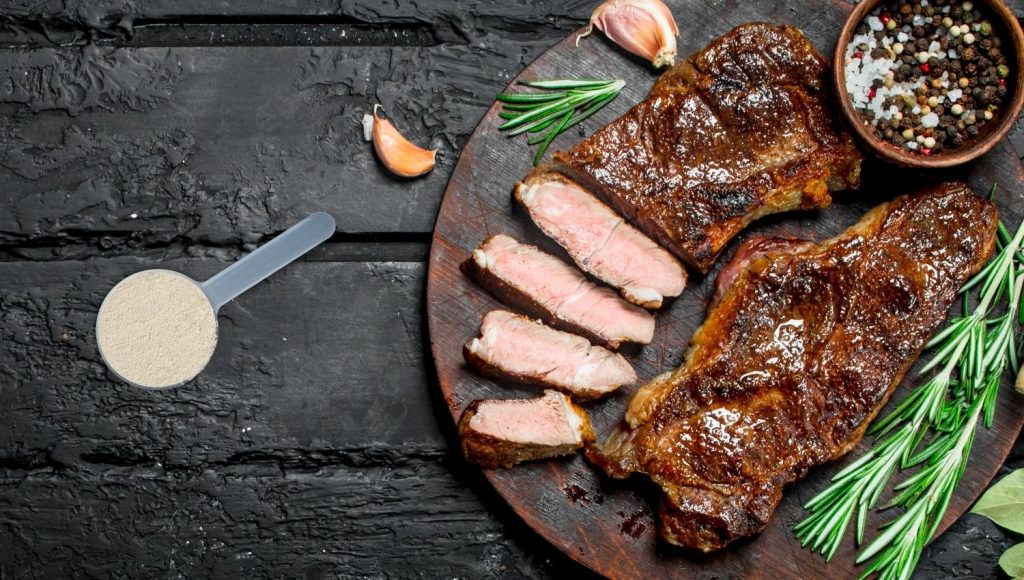
That poor advice would certainly boost our multi collagen protein supplement sales, however, it’s not sound nutritional advice and doesn’t align with our belief to get nutrition from food first, then supplement (yes, we’re not the average supplement company).
Collagen can’t be treated like other types of protein, such as animal proteins (beef, poultry, fish, seafood, dairy) or plant proteins (seeds, plant-based milk, beans), because collagen is not a complete protein — it lacks the amino acid tryptophan. If you decided to just eat collagen protein, you wouldn’t get all 20 amino acids that your body needs to survive.
However, collagen is unique. And your body needs it. Some people, like the godfather of Primal Foods Mark Sisson, even suggest that collagen could be the 4th macronutrient. Dr. Cate believes it’s a missing food group. Though it’s not a complete protein, it’s still incredibly vital.
So, of those 60 to 100 grams of protein needed per day, how much of that should come from collagen protein?
Collagen RDA
Is there RDA (Recommended Dietary Allowance) for collagen protein? This whole conversation would be MUCH easier if there was.
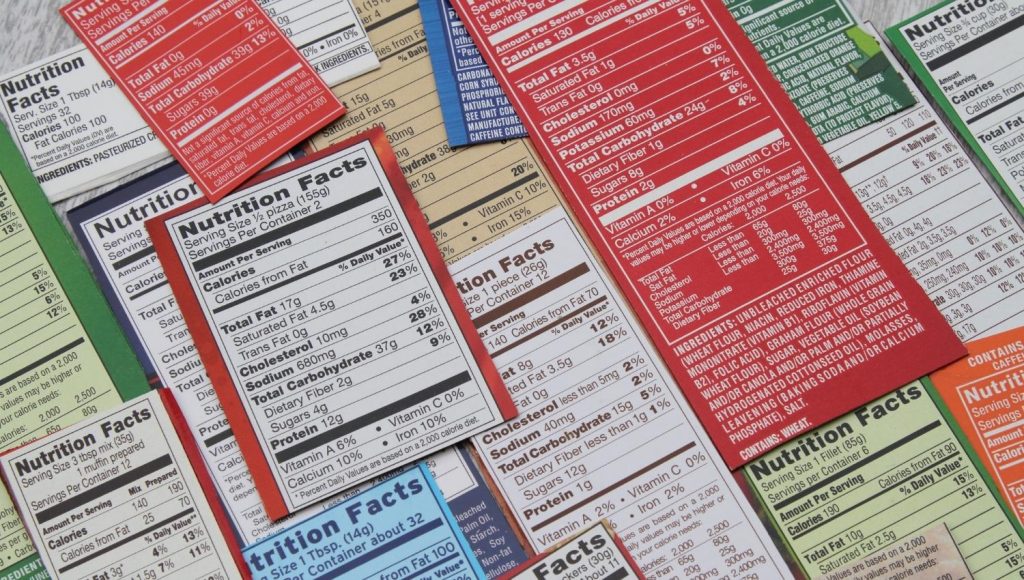
Unfortunately, there is no collagen RDA. This puts collagen in a unique category because other nutrients do have recommended dietary allowances such as:
- micronutrients (i.e. vitamins, minerals)
- macronutrients (i.e. carbohydrate, protein, fat)
- other (e.g. fiber)
What does this mean, exactly? Can you have too little? Too much? Can you bathe in collagen powder? Can you eat 50 collagen gummies a day? HELP!
Since there is no RDA for collagen, we must look for clues. Here are 3 clues we have to help us determine how much collagen you need per day.
Collagen RDA clue #1: Ancestral eating

Can we answer this collagen RDA conundrum by studying our ancestors? Absolutely.
10% of their total protein likely came from collagen-rich foods, including skin, broths, and organ meats such as tripe.
— Dr. Cate, M.D.
Dr. Cate goes on to say, “We know this by studying human evolution and cookbooks”. Recipes from around the world reveal that all cultures boil collagen-rich bones, tendons, and other collagen-rich organs to make stews and soups. Based on the idea that broths made this way contain about 4 grams of collagen per cup, and doing some very rough estimate-based calculations, the 10 percent figure seems like a good one. It could easily have been twice that, though.
Let’s do the math. If they ate 100 grams of protein after hunting and gathering, a minimum of 10 to possibly 20g of those protein grams were collagen protein. This is certainly more collagen than most of us are eating today.
Collagen RDA clue #2: Today’s eating
We don’t eat like our ancestors. We’re looking at you Doritos and sugary soda.

Nearly 0% of the average person’s total protein comes from collagen.
Ouch.
As we suggested prior, collagen is a missing food group. Not consuming any collagen protein brings major health implications. So, is 0 grams enough? Um, no way.
Collagen RDA clue #3: Scientific Evidence
The last clue in helping us estimate how much collagen you need per day is to look for scientific evidence, albeit small, that could guide us here.
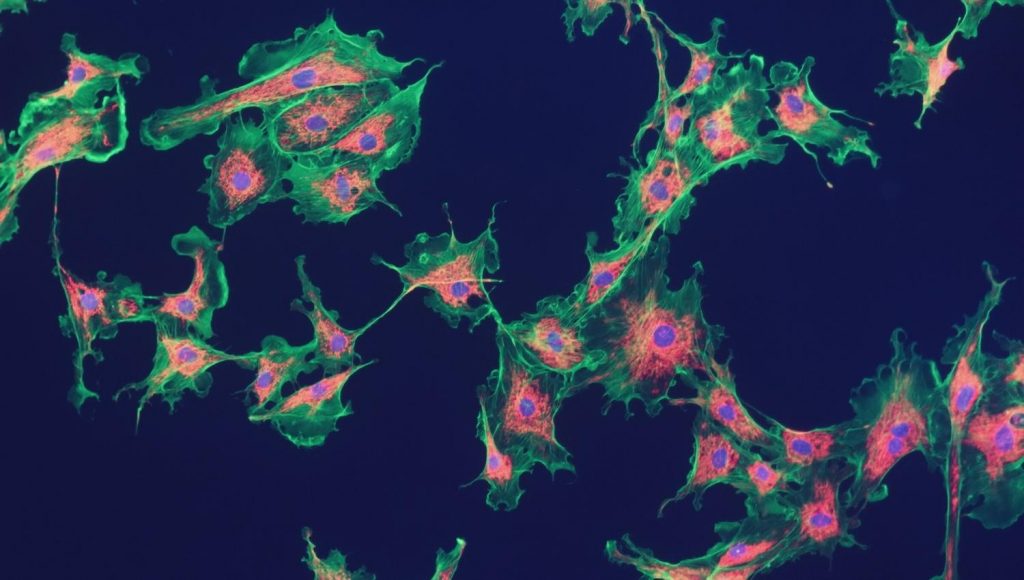
This study by NCBI suggests that 36% of daily protein could come from collagen peptides, while simultaneously getting all the essential amino acids you need. Of course, this only works if 64% of your other protein intake is coming from animal-based proteins — plants are not great sources of essential amino acids. This would nicely round out your overall protein strategy.
OK, now we’re getting somewhere. Let’s do the quick math:
- Protein goal: 100g. You could consume 36g of collagen protein!
- Protein goal: 80g. You could consume 29g of collagen protein!
- Protein goal: 60g. You could consume 22g of collagen protein!
There are further studies that suggest taking 2.5 to 15 grams of hydrolyzed collagen peptides each day may be safe and effective, including specific daily doses for specific benefits such as:
- 2.5 grams daily = joint pain benefits, skin health & hydration
- 5 grams daily = improved bone density
I love this product!
"I'm a nutrition scientist and recommend it when I can. The high quality of the multiple types of collagen is superior to anything else on the market."
- Michelle (Tappahannock, VA)
28 Calories
7g Protein
0g Carbs
The bottom line: our RDA estimate!
Alright, the magic number you’ve been patiently waiting for. Here it is.
How many mg of collagen per day?
For you milligram folks, here’s a quick conversion from collagen grams to collagen mg. The average person should aim for 10,000 mg to 40,000 mg of collagen protein per day.
BOOM. Now, let’s talk about how to make that happen!
Getting collagen from food: proper dosage
Can you get your RDA of collagen from food?

You can get all the collagen your body needs from food. You don’t need a supplement (see collagen supplement dosage below). However, this way of eating has to be very intentional and specific.
To consume all the collagen you need from food, you need homemade bone broth and radical nose-to-tail eating — which includes all the parts of the animal in the broth.
— Dr. Cate, M.D.
If that’s how you’re approaching getting your collagen, good on you. You’re likely getting your RDA of collagen protein! If you don’t eat like that (and most of us don’t!), it’s best to look for a collagen supplement to fill the gap.
Collagen from supplements: proper dosage
Before we dive into the proper dosage of a collagen peptide supplement, let’s do a quick review:
- Women need 60-90g of protein per day
- Men need 70-100g of protein per day
- You should consume all types of protein (collagen + animal and/or plant)
- Science shows that about 1/3 (36% to be exact) of your daily protein can come from collagen (if the rest is animal-based protein)
- On average, aim for 10-40g of collagen protein per day
- You can get all our collagen RDA from food, but it’s challenging
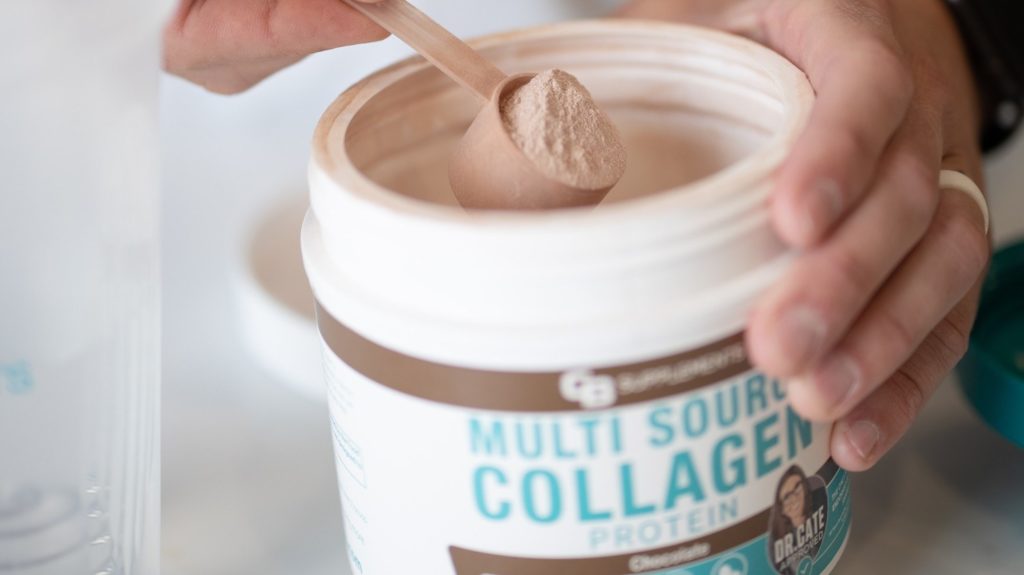
Let’s now turn our attention to collagen supplements.
First, learn the pros and cons of collagen supplements. Then, understand the best way to take collagen. As you’ll discover, each type of collagen supplement form (powder, pills, gummies, etc.) has a different serving size. For example, if you compare collagen powder vs pills, you’ll notice drastically different amounts of collagen protein per scoop/pills (7g vs 3g per serving) — collagen liquids vs powder also has disparity. Every brand is different when it comes to how much actual collagen is in each serving size.
The key here is to read labels. A single serving of collagen pills will give you much less collagen protein than a scoop of collagen powder. You can’t determine the proper collagen dosage by simply using the supplement’s vehicle (powder, pill, gummy, drink, etc.) as your guide. Focus on consuming 10-40g per day as we explored above.
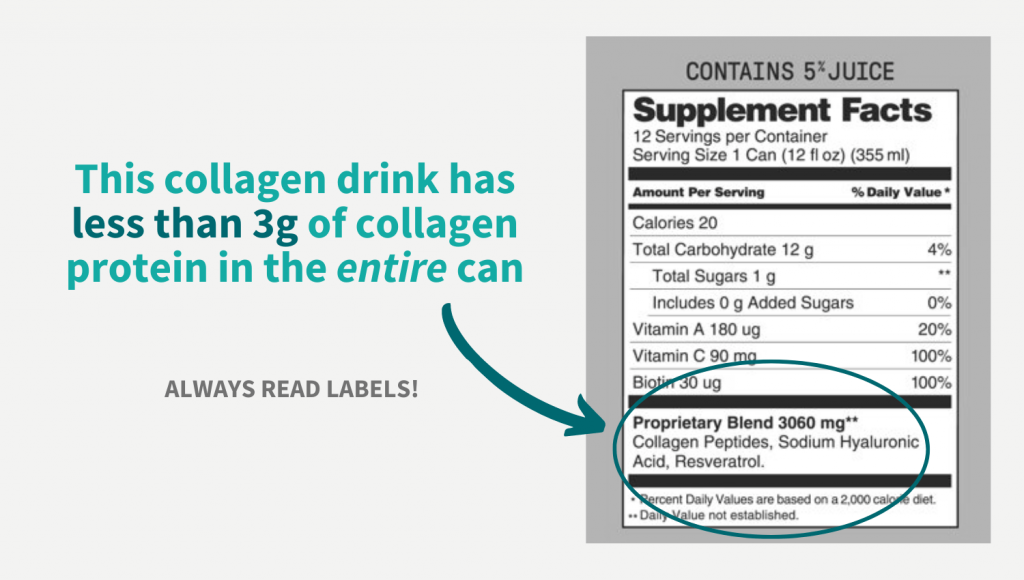
Hydrolyzed Collagen Powder dosage
How many scoops of collagen powder should you take per day? Since we focus on collagen powders, we get this question often.
The answer depends on your weight. The magic formula we’ve come up with, based upon our RDA estimate from above, is 1 scoop per 50 pounds of body weight with a maximum of 4-5 scoops per day.
If you look at our product labels, you’ll see our serving size is 1 scoop, which totals 7g of collagen protein. Now, that’s nowhere near the 10g-40g we’ve recommended. Why would we do this? We have no choice. The FDA requires that a dietary supplement puts a maximum of 1 serving (in our case, 1 scoop) on the label. And that’s what we did — and why we get many questions about dosage. 🙂
Pretty simple, right?
Consumption Tips
Now that you understand protein, collagen protein, RDA, and how to get collagen from food and/or supplements, let’s discuss common questions around frequency and safety.
Should you take collagen every day?
Our founder, Charlie, likes to answer this question with a toothbrush analogy.
Taking collagen is like brushing your teeth — you should do it every day.
— Charlie
Founder
Science and nutrition suggest that you need collagen protein every day. You can choose to get it from food and/or a supplement — your choice. There is a reason one of our two lines of multi collagen supplements is called Every Day (see those products here). I personally drink bone broth most days AND I take our collagen powder every morning with my coffee.
Can you take your collagen all at once?
We’ve explored this topic of timing (article above), but let me summarize in three words:
It doesn’t matter.
If you’re an OMAD (One Meal A Day), there’s no downside to taking all your collagen in a single meal. If you’re coming off a fast (see Does Collagen Break a Fast?), and worried that you’re eating too much collagen post-fasting, don’t worry.
We would recommend against taking a per meal approach with your collagen consumption (e.g. “I’m going to take a scoop of collagen with every meal”) since that could range from 1 to many means depending on your frequency. Focus on how much collagen you need total per day, and then simply do the math.
Can you overdose on collagen?
Is too much collagen a thing? Is too much of anything a good thing?
Though collagen is generally safe for everyone, taking too much of any protein puts stress on the kidneys and could harm kidney function in people with kidney disease. Though we won’t explore the impact of too much protein in this particular article, it’s worth noting here. What’s also important to highlight is too much collagen gets turned into fat, which is true with anything in your body.
With that said, if you do want to overeat on collagen, do it in food format — not a supplement!
Final Takeaway
Any collagen is better than no collagen.
Overall, it’s probably smart to take a mixed approach to your collagen consumption. Collagen from food has zero processing but is more challenging to purchase, cook, and consume. When was the last time you ate tripe? Oh, never? Yea, me too. Collagen from supplements is much more convenient to purchase, mix, and consume. Here’s how you can take collagen peptides in various ways!
One more thought. We’re making a case for our genetic need for collagen. Dr. Cate’s book, Deep Nutrition, supports this need for traditional food.
However, you approach this collagen consumption conundrum, be confident that you’re feeding your body what it needs by getting collagen protein in your diet every day!



